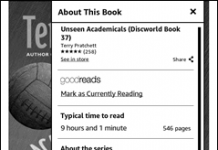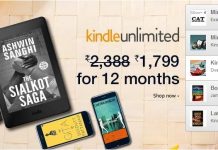 On GigaOm, self-described midlist author Simon Wood sets out his opinion on e-books. He notes seeing a number of authors being either pro-e-books at the expense of print, or vice versa, while to his mind e-books are simply another revenue stream. It makes sense to make them available for people who want them, just as it makes sense to do the same for printed books or audiobooks.
On GigaOm, self-described midlist author Simon Wood sets out his opinion on e-books. He notes seeing a number of authors being either pro-e-books at the expense of print, or vice versa, while to his mind e-books are simply another revenue stream. It makes sense to make them available for people who want them, just as it makes sense to do the same for printed books or audiobooks.
(As if to prove his point, an advertising box in the middle of the article included links to two of his e-books on Amazon, for 99 cents or $1.99 respectively. Oddly, it also included a link to a $9.99 e-book by John Shirley. Presumably it was auto-generated by the article’s context, not created specifically because Wood was writing the story.)
Wood likes the lack of barriers to entry for publishing e-books, and the ability to self-publish rather than having to find a publisher. He also points out that it is a great thing to do with the backlist of books whose rights have reverted to him, or which did not have the electronic rights sold to begin with.
In an interview on the Kindle Author blog, Wood goes into more detail about this benefit:
As the moment, I’m using publishing my backlist on Kindle. Kindle is proving to be a great vehicle for this. Just because a book goes out of print, it doesn’t mean it should gather dust. I think that’s where the ebook revolution pays off in spades. It makes it financially viable keep titles current [sic]. I also think ebooks are a great place to experiment with stories that don’t conform to conventional formats, such as novellas. I’m planning on releasing some original works that wouldn’t normally get a shot because in print they wouldn’t be financially viable.
Back on GigaOm, addressing the “versus” issue that has been getting a lot of press lately, Wood writes:
I don’t really know where the e-book revolution will go. It might be a tougher proposition to replace the printed book than people might think. I believe printed books will be around for some time. There’s probably going to be even more consolidation among the publishers, which will limit places for midlist authors, but even that’s not the end of the world. It might not be financially viable for the big publishing houses to support midlisters, but that isn’t to say there isn’t profit to be made. Advances in technology when it comes to book manufacturing and audio production means it’s pretty cost-effective to produce a print book or an audio book. Orphaned writers might want to take a leaf out of W. Griffith, Charlie Chaplin, Mary Pickford and Douglas Fairbanks’ collective book when they created United Artists and formed author cooperatives to produce their own print, audio and e-books. The potential is there.
This really is an exciting time for e-book lovers, and perhaps even readers in general. But then, history being what it is, there’s always something interesting going on. I have no doubt in twenty years the publishing industry will find whatever its then-current crisis is exactly as engaging as e-books are today.
































Scrubs and Road Rash are both 99 cents at Barnes & Noble.